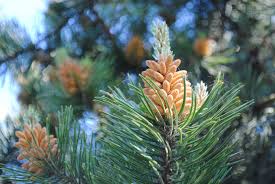Pine Pollen is a term used to refer to supplements derived from the pollen of pine trees. Pine trees in general refer to the genera of pinus.
Contents
Uses
-
Used as a dietary supplement.
- Pine pollen powder has been used extensively in traditional cultures throughout Asia. The earliest mention of pine tree pollen’s medicinal use is in Chinese herbalism from the classic text “The Pandects of Materia Medica” by Shen Nong.
- The benefits of pine pollen have also been used by the Koreans where it is sold in boxes much like baking soda or other baking ingredients. It is used in food for it’s amazing mineralization and adaptogenic properties.
- To date there is no information about pine pollen powder’s history of use in Western herbalism, Native American herbalism or Ayurvedic herbalism. All of these systems have used pine nuts medicinally (which are mildly androgenic) and Native American herbalism uses the inner bark of pine trees as a food and medicine as well.
Benefits
- Androgenic (stimulates anabolic endocrine activity)
- Nutritive/Tonic (Western/Asian herbalism terms for herbal adaptogens, meaning it has no toxicity over long term use)
- Aphrodisiac (promotes a healthy and high libido)
- Lung tonic (boosts the immune system and beautifies the skin which are both controlled by the Lung organ system in Asian medicine)
- Kidney tonic (very rejuvenative to the brain, hair, bones and endocrine system which are controlled by the Kidney organ system in Asian medicine)
- Liver tonic (stimulates liver regeneration and regulates bile secretion which are controlled by the Liver organ system in Asian medicine)
- Heart tonic (increases cardiovascular endurance, raises blood levels of Superoxide Dismutase and lowers cholesterol)
- Spleen tonic (Nourishes the muscles and increases metabolism which are both governed by the Spleen organ system in Asian medicine)
Cautions
- Those who are in an atmosphere filled with pine pollen dust, can’t help but inhale or take it in indirectly. But, although these pollens are found in abundance, they are not the common cause of hay fever or allergy symptoms, like ragweeds or other tree or grass species.
- According to the National Institute of Allergy and Infectious Diseases, “pine tree pollen is produced in large amounts by a common tree, but it is not a major cause of pollen allergies for most people. This is because the components in pine pollen are less likely to cause an allergic reaction.” (Source) This is thought to be due to its relatively large-sized molecule and low antigenicity effects or the capacity to induce immune response.
Interactions
Unknown, please consult with your doctor.
Other names
pinus
References
Source: Secretsoflongevity, http://www.secrets-of-longevity-in-humans.com/pine-pollen-powder.html
Superfoodsforsuperhealth, http://www.superfoods-for-superhealth.com/pine-pollen-benefits.html

